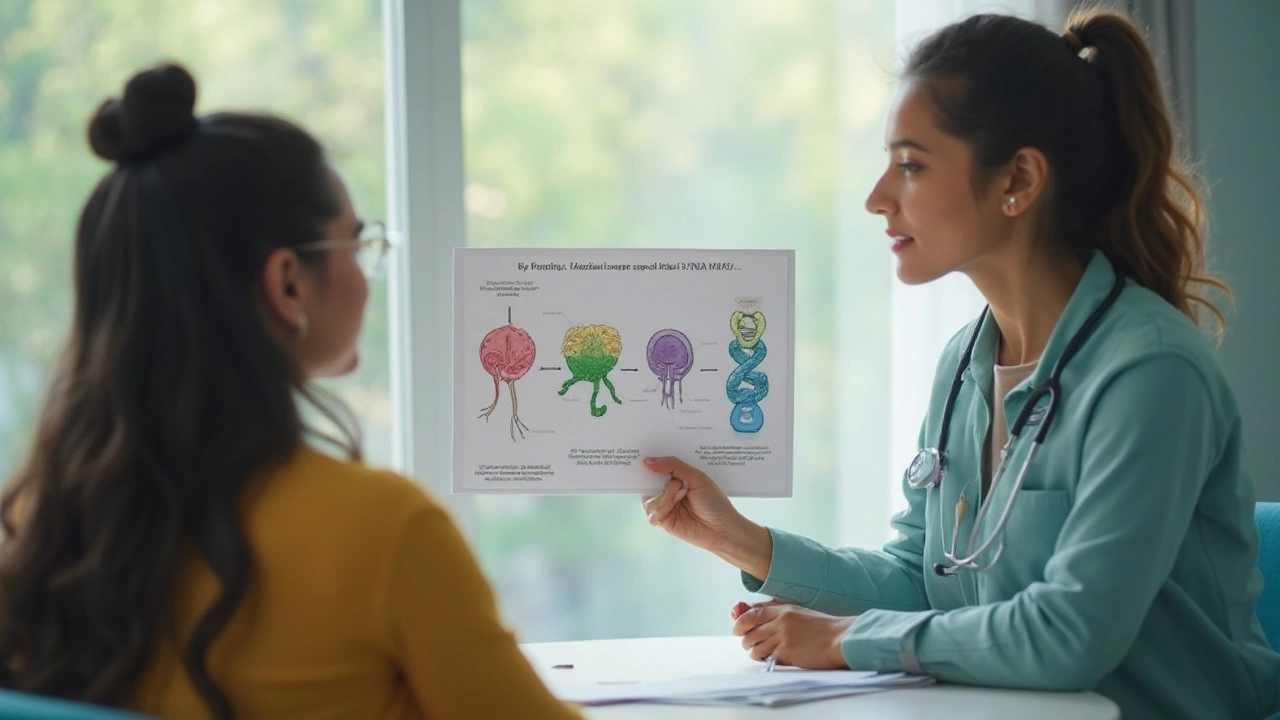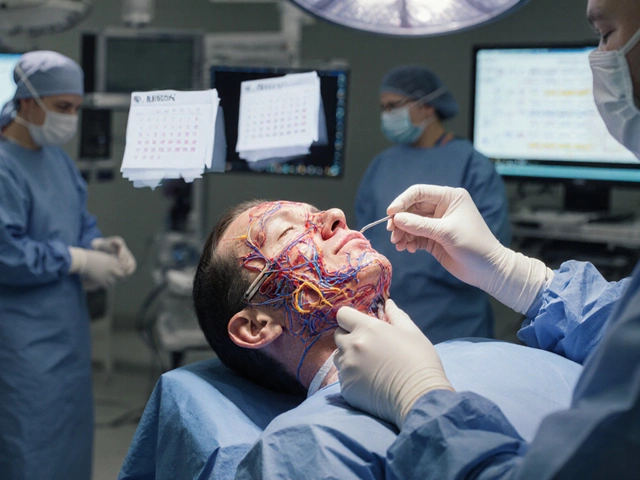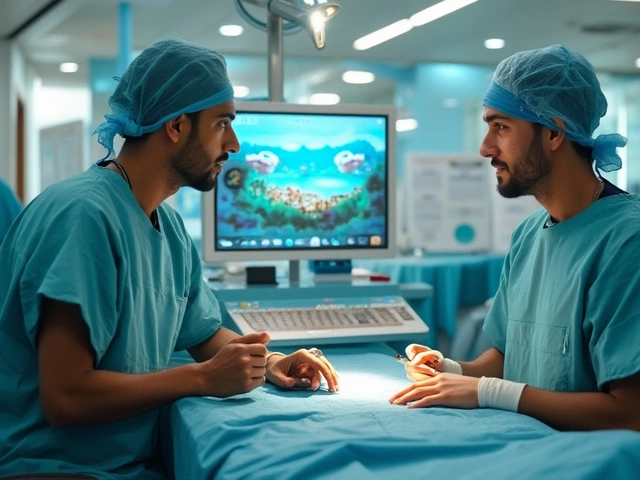Ever wondered if a baby born through IVF is actually genetically yours? You're not alone. This question pops up everywhere—from family group chats to dinner tables—especially when someone starts thinking seriously about IVF.
Here's the unfiltered truth: If you use your own egg and your partner's sperm, the baby will have your DNA, just like a baby conceived without IVF. The lab just helps your egg and sperm meet up, grow into an embryo, and then gives it a nudge into your uterus.
But what if you use donor eggs or sperm? Then, the DNA comes from the donor and whoever's genetic material you use (yours, or your partner's). For example, if you use a donor egg and your partner’s sperm, the baby shares DNA with your partner and the donor, not you. If you use both your own eggs and sperm, the genetics are all you and your partner.
This basic info clears up a ton of confusion. And trust me, people have wild ideas—like maybe the baby is part lab technician, or that IVF somehow “changes” your DNA. Science says nope, that's not how it works at all.
So, if you’re worried about the genetic side of IVF, knowing whose egg and sperm you use gives you all the answers you need. It’s more straightforward than most people think.
- What Actually Happens During IVF
- How Genetics Work in IVF
- Using Your Own Eggs and Sperm vs. Donor
- Common IVF Myths About Genetics
- FAQs About Genetic Relationships After IVF
- What to Ask Before Starting IVF
What Actually Happens During IVF
If you’re curious about what really goes down during IVF, here’s the plain and simple version. IVF stands for in vitro fertilization—which literally means “fertilization in glass.” We're talking test tubes and petri dishes, not science fiction.
Here’s how the process typically unfolds:
- Ovarian stimulation: First, you take hormone shots to help your ovaries grow more eggs than usual (most people only release one egg naturally per month).
- Egg retrieval: Once the eggs are ready, your doctor collects them from your ovaries using a thin needle, usually while you’re lightly sedated.
- Sperm collection: Your partner (or a donor) provides a sperm sample. The sperm gets cleaned up and prepped in the lab.
- Fertilization: The best eggs and sperm are mixed in a petri dish. In some cases, a single sperm may be injected directly into an egg (this is called ICSI, often used if sperm quality is low).
- Embryo culture: After fertilization, the new embryos grow in the lab for about 3 to 5 days.
- Embryo transfer: The doctor places one (sometimes two) embryos into your uterus using a thin tube. It’s quick and doesn’t require anesthesia.
- Pregnancy test: After about two weeks, you’ll take a blood test to see if the embryo has implanted and you’re officially pregnant.
Here are some numbers for perspective:
| Step | Typical Duration | Success Rate (%) (per cycle, age < 35) |
|---|---|---|
| Ovarian Stimulation | 8–14 days | - |
| Egg Retrieval | 30 minutes | - |
| Fertilization & Embryo Culture | 3–5 days | 60–80% eggs fertilize |
| Embryo Transfer | 10–15 minutes | - |
| Chance of live birth | - | ~40% |
One thing everyone should know: throughout the IVF process, the doctors let you know at every step how things are going—how many eggs were collected, how many fertilized, how the embryos are growing. You always get a say in how many embryos to transfer, and if any are left, you can freeze them for future cycles.
So the IVF baby genetic connection? It all comes down to whose egg and sperm are in that petri dish—nothing more complicated, no hidden labs or crazy genetic swaps. It’s high-tech, but at the core, it’s still your biology at work (unless you use donor eggs or sperm).
How Genetics Work in IVF
So, when it comes to IVF baby genetic questions, let’s break down exactly how DNA gets passed along during IVF. The main thing to know: IVF doesn’t mess with your genes. Instead, it just helps the sperm and egg join, usually by mixing them in a lab instead of your body.
If you’re talking about standard IVF using your own egg and your partner’s sperm, here’s how the DNA split usually looks:
- Half of the baby’s DNA comes from the egg (that’s you, if you're using your own).
- The other half comes from the sperm (your partner, if you use their sperm).
This is exactly the same as it works when you conceive without IVF.
If you use a donor egg or donor sperm, the DNA comes from the donor and whoever else’s genetic material is in the mix. The uterus the embryo is placed in doesn’t change the baby’s DNA. Carrying the baby doesn’t pass along genetics; it’s all in the egg and sperm.
| Which Genetic Material Is Used? | Baby's DNA Comes From |
|---|---|
| Your egg + Your partner's sperm | You and Your Partner |
| Donor egg + Your partner's sperm | Egg Donor and Your Partner |
| Your egg + Donor sperm | You and Sperm Donor |
| Donor egg + Donor sperm | Egg Donor and Sperm Donor |
A wild stat—over 99% of the time, if you use your own egg and your partner’s sperm, DNA testing will confirm you're both the genetic parents, same as natural conception. No weird genetic changes happen in the dish.
One tip: If you’re using donor material, keep a record of the donor’s health history. Your doctor or clinic should help with this, but it’s good to keep for the future—just in case health questions pop up down the line.
Using Your Own Eggs and Sperm vs. Donor
This is where things get real for anyone thinking about IVF. The source of the egg and sperm decides everything about the baby’s genetics. If both are yours (and your partner’s, if you have one), the baby’s DNA is a straight match to you just like in any regular pregnancy. But if you go the donor route—egg, sperm, or both—that changes the genetic picture entirely.
Here’s a breakdown of the most common scenarios:
- IVF baby genetic link is 100% yours if you use your own eggs and your partner’s sperm. The lab only handles fertilization outside the body, making no changes to the DNA.
- If you use donor eggs, the baby will carry the DNA from the donor and whoever provided the sperm. In this case, you still carry the child, but you don’t pass along your genes.
- If you use donor sperm, your egg’s DNA stays, while the other half comes from the donor. The same thing happens for single moms or same-sex female couples.
- Using both donor egg and sperm? Then the genetics all come from the chosen donors. You’ll carry the baby, but the DNA doesn’t match you or your partner.
A quick look at what this means in real life:
| Egg Source | Sperm Source | Baby's Genetic Connection |
|---|---|---|
| Own | Partner | To both parents |
| Donor | Partner | To partner and donor |
| Own | Donor | To mother and donor |
| Donor | Donor | To both donors |
Here’s something most people don’t realize: if you carry the pregnancy (even with a donor egg), you’ll still influence your baby in small ways. Recent studies suggest things like your health and even your diet during pregnancy can affect how some of the baby’s genes behave, through something called epigenetics. But the core DNA—the stuff that gets passed to the next generation—only comes from the egg and sperm sources.
If you’re thinking about donors, here are a few questions to discuss with your doctor:
- How is donor screening handled?
- Can you get info about the donor’s health and medical history?
- What kind of legal paperwork is involved with using a donor?
Making the decision between your own or donor eggs or sperm isn’t just a medical thing—it’s emotional, too. If you’re stuck in this choice, talking to a fertility counselor can help clear up what matters most to you and your family.

Common IVF Myths About Genetics
A bunch of myths float around IVF, especially when it comes to genetics. If you're talking with friends or Googling late at night, you’ve probably seen people say things that just aren’t true. Let me bust a few of the big ones and make things clear.
- IVF baby genetic material is exactly the same as a baby conceived naturally—if you use your own egg and sperm. The whole process is about bringing those two cells together outside your body, not changing their DNA or adding anything new to them.
- Some folks think the baby might end up with lab DNA because embryos are handled in a clinic. This isn’t possible. Lab technicians never add or swap DNA. They just create the right conditions for fertilization and embryo growth.
- Another rumor says IVF makes “unnatural” babies, or that science somehow tampers with genes. The only time genes are changed is through a completely different process called gene editing—which is not involved in regular IVF treatment at all.
- Some worry IVF leads to more birth defects. Recent studies, like the one published in JAMA Pediatrics (2023), show IVF babies face about the same risk of genetic issues as babies from natural conception. The chances are very similar—less than 4% for both.
- Think using hormone injections messes with the baby's genes? That’s not how hormones work. They help your ovaries produce eggs; they don't affect the baby’s DNA.
Here’s a quick glance at how the facts stack up against the myths:
| Myth | Fact |
|---|---|
| IVF babies have lab DNA | DNA comes only from the egg and sperm, never from lab staff |
| IVF dramatically raises risk of genetic diseases | Risk is very similar to natural conception (<4%) |
| Doctors change the baby's genes during IVF | No gene editing in regular IVF; embryo DNA is untouched |
| Hormones used in IVF affect the baby’s DNA | Hormones help egg growth; DNA doesn’t change |
Bottom line: Know the difference between what you hear online or in gossip and what actual science says. If you ever find yourself doubting, ask your fertility doctor or go straight to trusted sources, not unverified forums.
FAQs About Genetic Relationships After IVF
People have loads of questions about where DNA really comes from in an IVF baby genetic situation. Let’s clear the air with some straight answers.
- Is an IVF baby my biological child? Most of the time, yes. If you're using your own eggs and your partner's sperm, your baby’s DNA is a combo of both of yours, just like with natural conception. The difference is that fertilization happens in a lab, not in your body.
- What if I use an egg or sperm donor? Your child will share DNA with whoever provided the egg and sperm. So, if you use a donor egg and your partner’s sperm, the baby will have your partner’s DNA and the donor’s. Same goes if you use a donor for sperm but keep your own egg.
- If I carry the pregnancy and use a donor egg, does the baby get any of my DNA? No. Carrying the pregnancy doesn't change the baby’s genetics. Your body helps the baby grow, but all the genetic info comes from the egg and sperm that made the embryo.
- Can IVF change or damage my baby’s genetics? IVF itself doesn’t change your DNA or create strange mutations. IVF babies are just as healthy, genetically, as babies made without medical help.
- I’ve heard about ‘epigenetics’ – does being pregnant with a donor egg mean anything gets passed on from me? Your body does influence which genes turn on or off (that’s what epigenetics is about). There’s some science showing that the womb can affect how certain genes work, but your actual DNA isn’t passed on if you didn’t use your own egg.
- Will my IVF baby look like me? If you use your own genetic material, yes, most likely! Same chance as with natural conception. Appearance depends on a mix of your genes, your partner’s, and sometimes pure randomness.
Still got questions? Always ask your fertility doctor for specifics—each case is a bit different. But the basics here cover what happens in almost all situations when it comes to genetics and IVF.
What to Ask Before Starting IVF
If you’re thinking about IVF, the questions you ask now can save you stress later. No matter how ready you feel, it’s easy to miss the small stuff when the world of fertility clinics and paperwork hits you. There’s a lot more to it than just showing up for appointments and letting the doctors work their magic.
Start by asking your clinic these straight-up questions:
- IVF baby genetic links: If we use our own eggs and sperm, will our baby be genetically ours? Ask the doctor to explain it back to you in simple terms. It feels oddly comforting to hear this from a real expert.
- Success rates: What are your actual pregnancy rates for someone my age and situation? Different clinics show off different numbers, so look for what lines up with you, not some group average.
- Testing: What genetic tests do you offer? Will there be screening for specific conditions or just a basic checkup? If you want to avoid surprises, get the details up front.
- Donor situations: If we need donor eggs or sperm, how does the selection process work, and what do we know about the donor’s background? This is where you want to get picky and clear on your options.
- Costs, and what’s really included: Are meds separate from the listed price? Is embryo freezing extra? Clinics sometimes gloss over these, and little details can add up.
- Risks and side effects: What are the common and rare risks? Knowing what you might feel, both physically and emotionally, helps you prepare and plan ahead.
- How many embryos will you transfer, and why? Transferring more isn’t always better—ask about their policy and what’s best for you.
Ask anything that pops into your head, even if you’re worried it sounds silly. I’ve been that guy—it’s way better to feel awkward for a few seconds than deal with regrets or confusion for months.
On a side note, see if your clinic offers counseling or a support group. IVF can mess with your head, and talking to others who’ve gone through it can make things feel less overwhelming, especially when those big genetic questions creep in late at night.






